By Mike Steely
All Tennessee State Parks have some connection with our state’s history but Harrison Bay State Park just north of Chattanooga touches that category more than most. The 1,200 acre park on Chickamauga Lake on Highway 58 can claim pre-statehood links through the Cherokee, an early statehood town site, and the Tennessee Valley Authority.
The large park, a haven for RV and tent campers as well as local fishermen, has three large campgrounds with electric and water available, reasonable overnight rates, and a wide variety of activities including fishing, boating, swimming, birding, a Jack Nicklaus Golf Course, picnicking, playgrounds, sports fields, shelters, group camping and even primitive camping.
The RV sites now offer wifi internet service but the sites tend to fill up on warm weather weekends so if you’re planning to camp you should check the internet reservation site or call the campground.
Harrison Bay has the longest shoreline on Chickamauga Lake and is busy with kayaks, paddle boats and bass boats. Historically the area, long before the lake, was busy as well. The park has 4.5 miles of biking trails, walking trails, and one of the tent areas has 24 open-air cabins with bunk beds.
The park is located in what was once the territory of the Chickamauga Cherokee, the renegade off-shoot of the Overhill villages who left the Vonore area in order to continuing waging war on white settlements in East Tennessee and Kentucky. After the resistance was over many of the Chickamauga chiefs, some who were mixed-blood descendants of English and Scottish traders and soldiers took up the white ways and became very wealthy.
One of these was James Vann who owned the area that is now Harrison Bay. He and his son, Joseph, established a ferry there across the Tennessee River and established a mill. A small town, called Vann’s Town, developed around the ferry. In 1779 the town was ravaged by Col Evan Shelby’s expedition but, following the war, the town was reestablished and grew. Joseph Vann built a home and resided there a few years before leaving during the Cherokee Removal, settling in Arkansas Territory. “Rick Joe” Vann took his considerable wealth, his family and his slaves with him. He was said to have owned 35 horses, the ferry, a mill and the property now encompassing the park.
The old Vann House stood there until 1900.
On the same site the Hamilton County town of Harrison developed and became the first meeting place of the new county government when the court met at Poe’s Tavern there in 1819. Most of the town was inundated by the waters of the TVA lake.






